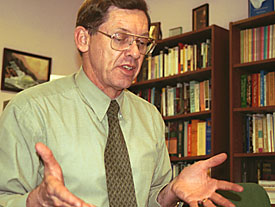 |
|
SUSIE LEMONT/Arizona Daily Wildcat
|
Jerrold Hogle, Strategic Planning and Budget Advisory Committee chair, is impressed with Likins' commitment to seeking out faculty input.
|
|
By Jeff Sklar
Arizona Daily Wildcat
Wednesday March 5, 2003
When President Pete Likins unveiled in September his goal of transforming the UA into a leading research institution, he established a plan for reshaping the university through program cuts, mergers and reorganizations.
The process, he said, would be "transparent but not democratic."
In other words, Likins would welcome input from across the university, although he would ultimately decide what would survive, what would be cut and what would be changed.
About a month ago, Likins and Provost George Davis released more than 50 proposals for narrowing the UA's mission under their comprehensive Focused Excellence plan. As the semester unfolds, a variety of committees with extensive faculty representation will review the plans, offer suggestions and return them to Likins and Davis, who will make the final decisions.
Likins and Davis have emphasized that no decisions will be made without extensive consultation with faculty, students and staff. And while many faculty members seem satisfied with their role, some accuse the administration's approach of being too heavy-handed, saying faculty should have a direct, policy-making role in running the university.
Guiding the ship
As Marv Waterstone began his speech at last month's Faculty Senate meeting, Likins chuckled. Waterstone, an associate professor of geography, referred to a local newspaper article in which Likins said his job wouldn't be so difficult if more people were criticizing his Focused Excellence proposals.
"I'm here to make Pete Likins' day a little easier," Waterstone said.
Waterstone argued that administrators were ignoring faculty not just in the Focused Excellence process, but in university governance in general.
Waterstone believes administrators are out of touch with the needs of the faculty, and think of themselves as CEOs rather than educators. Focused Excellence, he said, is clouded in the "truncated vocabulary and vision of bureaucrats."
He wants professors to run the university, and believes administrators should come from the faculty and return once their terms expire. Only two of the approximately 50 faculty senators at that meeting applauded Waterstone's comments. However, his ideas appear to be gaining some acceptance among the faculty. About 80 faculty members have subscribed to the second incarnation of a listserv Waterstone created for people who share his concerns.
The first version of the listserv was shut down after questions arose about whether Waterstone used appropriate means of obtaining e-mail addresses, Robert Mitchell, secretary of the faculty, said at Monday's Faculty Senate meeting.
Now, everyone subscribed to Waterstone's listserv has asked to be on it.
Miklos Szilagyi is an electrical engineering professor who was one of the two who applauded Waterstone. Szilagyi, who served four years as president of a European university, thinks UA and other American schools should embrace the European system of university management, where the president is a faculty member and is perceived as the first among equals.
That wasn't what the Arizona Board of Regents had in mind when it hired Likins in 1997. Board members wanted an authoritative president with extensive academic background who could run the university like a CEO.
Likins believes universities need strong presidents who have power to make important decisions, especially in times of crisis. In this time of budget cuts, Likins equates his job with that of a ship's captain facing rough waters.
"People on the ship understand that they are in peril if someone is not in charge," Likins said.
Likins and Davis said they needed to apply that principle of strong leadership when identifying areas that could be cut, merged or reorganized under Focused Excellence. They made those decisions themselves, after weeks of meetings with deans and vice presidents.
Seeking out broad faculty opinion would not have been helpful, they said, because it would be tantamount to asking faculty to suggest their own elimination.
"It would be all too normal for faculty, in this situation, to recommend no change," Likins said.
Though Waterstone and Szilagyi said faculty should be making
policy, other faculty agree with Likins, saying clear administrative leadership is important, especially in crisis times.
"It is encouraging that President Likins and Provost Davis are willing to take risks and launch what surely must be one of the most dramatic reorganization endeavors ever attempted in a major U.S. university," John Hildebrand, a regents' professor of neurobiology, wrote in an e-mail.
 |
|
EMILY REID/Arizona Daily Wildcat
|
Steward Observatory Director Peter Strittmatter and other regents' professors sit on a committee that offers top administrators advice on how to uphold UA's academic mission.
|
|
Gathering feedback
Within weeks of arriving at the UA in 1997, Likins and then-faculty chair Jerrold Hogle signed the Shared Governance Memorandum of Understanding.
The agreement gives faculty members a consultative role in university decision-making, including the majority of seats on the Strategic Planning and Budget Advisory Committee.
That group makes spending recommendations to the president. And in the case of Focused Excellence, it will be the final committee to review and make recommendations on proposals for cuts, mergers and reorganizations before Likins and Davis decide which ones to ask the Arizona Board of Regents to approve.
Hogle now chairs the budget advisory committee, and has been impressed with the input it has had in the Focused Excellence process. Early in 2002 SPBAC recommended that six criteria be considered when deciding who would face budget cuts.
When Likins and Davis began the process that will lead to changes under Focused Excellence, they called those six criteria their principal guideposts for identifying potential cuts, mergers and reorganizations.
"That's where there was some very strong input that governed how we looked at the various programs," Davis said.
Hogle, a distinguished professor of English, heard Waterstone's comments at the Faculty Senate meeting, but rejects Waterstone's idea that faculty don't have policy-making influence.
"His concerns were expressed out of ignorance," Hogle said. "He doesn't really know what's going on."
Eleven of the 21 voting members on SPBAC came from the faculty, and six are elected members of the Faculty Senate budget committee.
"I am faculty, and I am being consulted," Hogle said.
In the five years since Hogle and Likins signed the shared governance agreement, Hogle has been impressed with the president's openness to faculty opinion. He credits Likins with giving two faculty members a spot on the president's cabinet.
Hogle and faculty chair Jory Hancock sit on Likins' 13-member cabinet, which also includes all university vice presidents. Hogle knows of no other president who has two faculty members on his or her cabinet.
Likins said he values their advice, as well as that of all faculty. Though major decisions are ultimately Likins' call, he said he's responsible for explaining any decision against their recommendation to faculty.
"Consult, decide, explain: that's the mantra that guides me," Likins said.
Further consultation
That consultation extends beyond SPBAC, encompassing the Faculty Senate, the newly formed Council of Regents' Professors and any faculty members who would be directly affected by changes under Focused Excellence.
 |
|
Consult, decide, explain: that's the mantra that guides me.
- Pete Likins
UA president
|
 |
Early this semester, Peter Strittmatter and a group of regents' professors, who have been recognized for making significant impacts in their fields, began
meeting to give advice and opinions to administrators. The group meets every two weeks, and approximately every three weeks meets with Davis to offer ideas about enhancing and maintaining quality academic programs.
"Universities are very complex places," said Strittmatter, who directs the Steward Observatory. "Any administration that did not listen to its creative faculty would be in trouble."
Thus far, the Focused Excellence process has been largely administrative in nature, Davis said. That's about to change.
Once administrators complete detailed proposals for the changes Likins and Davis have recommended, a myriad of faculty members will be consulted before any changes are approved. Faculty Senate approved the process last year, and it's in place to ensure that every faculty member directly affected by the possible changes has a chance to be heard.
Unless all those faculty agree to the proposed changes, the Faculty Senate and SPBAC, as well as undergraduate and graduate student government, will give input before Likins and Davis make a final decision on what to recommend to the regents.
"(Likins) counts on us to represent the views of the faculty to him," Hogle said.
But neither SPBAC nor the Faculty Senate is truly representative of the faculty, Waterstone said. Though faculty senators are elected, he said the group meets too infrequently ÷ for two hours a month ÷ and few faculty are interested in running.
He pointed to a campus memo sent out last week asking for more faculty to run in elections, which are taking place through March 7, a document he perceived as the senate "going begging for people to join them."
But as recently as Monday, several senators, including Faculty Chair Hancock, said the senate should take on more controversial issues.
"Maybe it's time that we do take some positions about things," said Andrew Silverman, a law professor.
Steep learning curve
Ultimately, neither the Faculty Senate nor SPBAC has any policy-making authority. Waterstone thinks they should, but administrators and Hogle said that faculty without an administrative background wouldn't always be able to grasp the complexities of university management. At Monday's Faculty Senate meeting, Likins told senators he would welcome their input on major issues like tuition and financial aid, but that it would take time for senators to study and understand the complexities of those discussions.
"It might take five meetings to get this body to fully understand the complexities of that issue," Likins said.
To understand university management issues, faculty members would also have to adopt a broader outlook when it comes to deciding what's best for the institution, administrators said.
Many faculty devote their lives to narrow academic disciplines, and have little need to pay attention to the overarching operational concerns that university administrators deal with every day, Hogle said. Though Waterstone wants faculty to rotate into administrative roles, he said it wouldn't be an easy transition.
"Most of us, most of the time, work in these little areas," Hogle said.
Davis, who as provost serves as Likins' top deputy and the UA's chief academic officer, has spent much of his 30-year career bouncing between faculty and administrative positions. When Likins had to appoint a provost, in 2000, he chose Davis, who was a regents' professor of geosciences, rather than an administrator.
But Davis had already served as a university president in Vermont, and worked as the UA's acting vice president for business affairs as well as a vice provost. Even with such an extensive background, Davis said he can't always grasp the intricacies of university management.
"All of those experiences are still not enough as far as being able to anticipate and deal with the complexities that come to the table," Davis said.
That doesn't mean faculty members can't learn; it just takes time and effort, said Betty Atwater, a SPBAC member and director of the School of Health Professions.
Atwater is in her 34th year at the UA, and has served on SPBAC for three years. The knowledge it takes to make educated budget recommendations doesn't come overnight, and takes lots of help, she said.
In the meantime, faculty committees will soon take on the task of reviewing the Focused Excellence proposals. Between now and June, when Likins expects to make final requests to the board of regents, he and Davis will take their concerns into account.
But when decision-making time comes, Likins is clear. Under the Shared Governance Memorandum of Understanding, he makes the call.
"It does not say we govern democratically," he said. "We don't."

